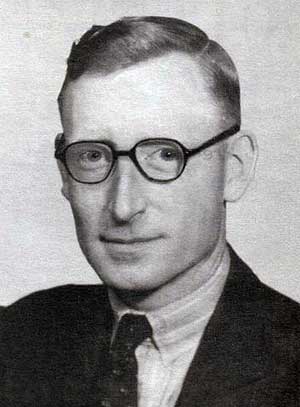Tommy Flowers
Tommy Flowers has been described as an unsung hero of World War Two for his work at Bletchley Park. Historians have argued that the code breaking achievements of Flowers, along with William Tutte and Alan Turing, significantly shortened the length of the war.
Born on 22 December 1905, Tommy Flowers grew up in the East End of London. After finishing school he worked as an apprentice engineer joined the General Post Office (GPO) as an engineer in 1926. Flowers joined the GPO research centre at Dollis Hill in 1930.
The research unit was moved to Bletchley Park at the start of the war. Flowers was asked to join the team by Alan Turing, who requested help in building a decode for the Bombe machine. Although the project was unsuccessful, turing was impressed by Flowers and introduced him to Max Newman a mathematician who believed it was possible to mechanise the decoding process for machines like the Lorenzo.
Flowers was employed to fix Newman’s machine: ‘Heath Robinson’. But Flowers was convinced that there was a better way of mechanising the decoding process as Heath Robinson was slow and kept on breaking down. He finished his first machine in December 1943.

‘Colossus’ was the world’s first programmable computer. It was left on permanently to preserve its 1,800 thermion valves. However, the managers of Bletchley Park remained sceptical and refused to fund the project.
‘Colossus’ was not only reliable, it was powerful. With the approach of D-Day, the Allies needed to know the Germans weak spots to formulate a strategy, and Colossus was capable of this. It was able to read 5,000 characters every minute.
‘Colossus 1’ and ‘Colossus 2’ were both running by 1 June 1944, meaning they were ready for D-Day.
Colossus gave Allies access to vital information from the Nazis. It proved invaluable in D-Day when the Allied speedily decoded a message which showed that Hitler believed the Allied would attack in the Pays de Calais. This resulted in far less casualties that if Hitler had known about the Allied plans.
Flowers was rewarded with £1,000 at the end of the war for his work – a sum that didn’t even cover his investment in the project.. Yet, Tommy Flowers still divided the £1,000 up among the team that had worked on the machine and gave himself £350.
Flowers work was highly classified during the Cold War era and he remained under the Official Secrets Act. Even in 1982, Flowers had to ask the MOD for consultation on what topics he could cover before giving a lecture.
Tommy Flowers died on 28 October 1998 at the age of 92.
See also: Max Newman
MLA Citation/Reference
"Tommy Flowers". HistoryLearning.com. 2024. Web.
